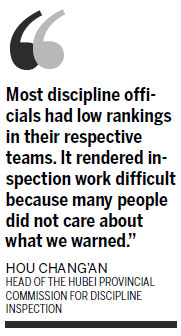'Hierachical change has made some sensible differences,' high official says
|
 |
Li Songyin, a discipline head of the Department of Justice in Hubei province, recently gained a subtle rise in the hierarchy of the governing body.
Li used to rank last in the nine-member Communist Party of China committee of the department. The change was made in April after a provincial order requiring all disciplinary heads following only Party secretaries or deputy secretaries in ranks.
"Although it is rather symbolic or a way for others to show more respect to disciplinary officials, the hierarchical change has made some sensible differences," he said.
Before the change, Li was usually the last one to speak at decision-making meetings of his department. "When we were running out of time, I did not even have a chance to express my view," he said.
He also recalled sometimes a few lower-ranking officials did not take him seriously because he was seen as not powerful enough.
In provinces, municipalities and autonomous regions, the key leadership is the all-powerful standing committee of the provincial-level CPC committee. The standing committee usually consists of a secretary, his or her deputy and a vice-secretary, followed by other members who share the ruling power, which is often divided into sections.
Led by secretaries, such standing committee members are often ranked in accordance with the significance of their mandates. The upgrade of discipline heads in ranks has shown the CPC's resolve to overhaul rule-violating or corruptive behaviors.
Hubei was the first to implement the rank change of disciplinary officials after Wang Qishan, secretary of the CPC Central Commission for Discipline Inspection, visited the province in November. During his visit, he emphasized the importance of reforming the disciplinary inspection system to contain the spread of corruption.

The top leadership is determined to target high-ranking "tigers" and low-ranking "flies" in its anti-corruption efforts. After taking the helm of the CPC in November 2012, Xi Jinping has led efforts in fighting corruption, calling on the whole Party to stay fully alert, describing corruption as a threat to the Party's very survival.
Hou Chang'an, head of the Hubei provincial commission for discipline inspection, hailed the reform as morale boosting.
"Most discipline officials had low rankings in their respective teams. It rendered inspection work difficult because many people did not care about what we warned," Hou said.
Following Hubei, Guangdong became in June the second in the country to issue a requirement for the rank change of disciplinary inspection officials in the CPC standing committees.
Another drive to empower CPC discipline watchdogs is to reduce their workload on tasks unrelated to the discipline mission.
According to a 2013 survey by the Shandong provincial commission for discipline inspection, 1,314 out of 1,801 discipline officials on the township-level were in charge of non-disciplinary affairs, while on the county-level, 73 in 137 such officials faced similar circumstances.
The "multitasked job" distracted them and cut efficiency, said Peng Yun, a discipline official in Guanqiao township of Liuyang, Hunan province.
Peng was in charge of a number of non-disciplinary tasks, ranging from transportation to city planning and tourism.
"I am supposed to be a 'judge' of the game, but I have basically become a 'player' in it," Peng said, pointing out that it was inappropriate to participate in so many fields while supposedly supervising them.
Beginning this year, prefecture-level governments in provinces, including Hunan, Gansu and Shandong, have made the job of their discipline officials clear, eliminating all work other than the disciplinary supervision.
Ni Xing, deputy dean of the School of Government at Sun Yat-sen University, regarded the political changes as a sign of the CPC's determination to continue the war on corruption.
